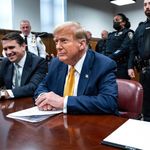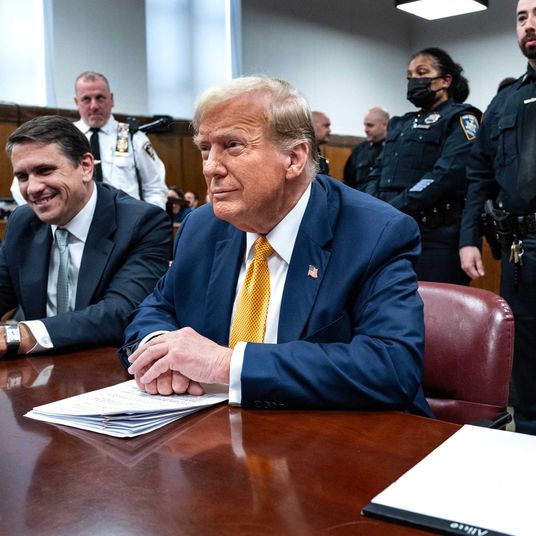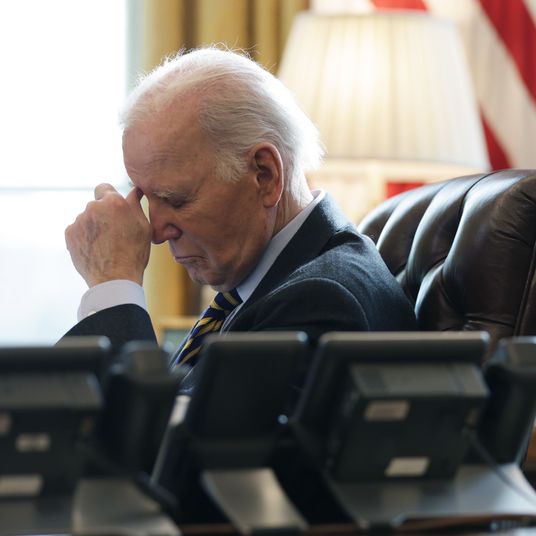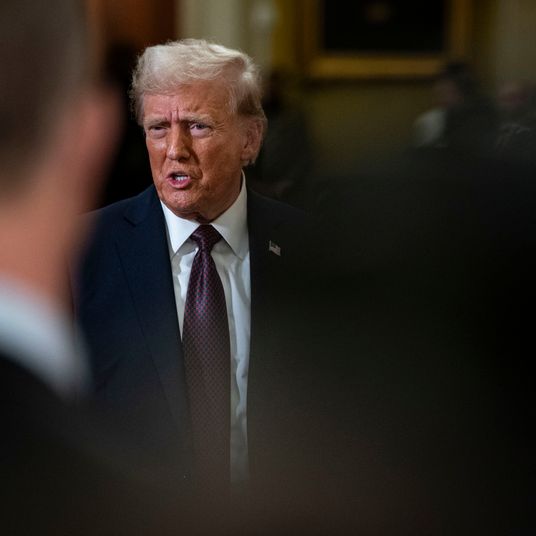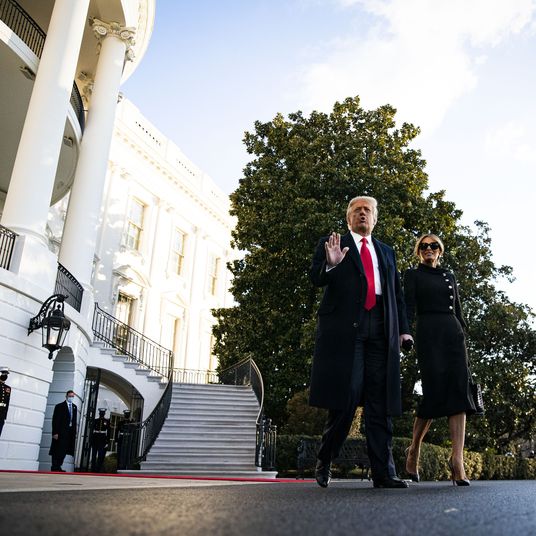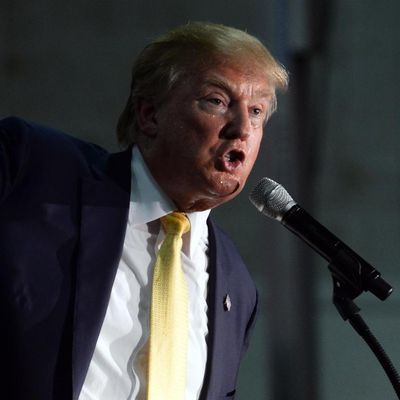
Every presidential candidate panders, but with Donald Trump, as with everything else about his campaign, the pandering is both more thunderously pitched and more personal. “You look good,” he informed a young man to his left who picked up a microphone to ask a question at an event in Rochester, New Hampshire, last night. “All fabulous people,” he said after inviting all of the elected officials present to stand; he seemed to recognize one, though possibly he could not summon a name: “Especially you.” When someone in the crowd said Obama was a Muslim and Trump did not correct or address the lie, the exchange made the news. But it was also true that Trump did not correct or disagree with anyone last night — it would have slowed the event’s breakneck pace. Apropos of nothing, Trump said, “How many people here believe in global warming?” He urged the believers to raise their hands and then surveyed the crowd, presumably trying to gauge whether this particular pander was a winning one. He was pleased; not many hands were up. “Very few,” he said. “Veeeery few … ”
Trump’s events have been said for months to be uniquely energetic, but, really, what is unique is the pace. After a short introductory speech (“In leadership I win like, forget it, not even a contest”), Trump took questions, each of which he took as a prompt to reiterate either his campaign’s opening gambit (that everything about the country was terrible) or its closing one (that everything would soon be amazing) and then moved on to the next question. Watching Trump answer policy questions is like watching a machine sort mail. Trump is not young, and during the very long debate the previous night he had flagged toward the end (“he seemed to be insulting people just to stay awake, like a truck driver lighting another cigarette,” observed Amy Davidson), but in New Hampshire he managed his vigor better: high energy, short duration.
Trump seemed eager to mention a few specific facts about public affairs he’d recently learned (a week ago, he said, he had gotten curious and asked what the trade deficit was) before everyone went home to bed; the effect was a little like listening to a tipsy foreigner in the third quarter of a Super Bowl party, announcing what he’d just learned about pass interference. Nabisco, Trump reported, was moving a large operation from Chicago to Mexico; he said he would no longer be eating Oreos. He mentioned that the U.S. had a $75 billion annual trade deficit with Japan and said the reason was that the people in charge of such things were “not very smart.” Trump’s promise (at some level this is the whole campaign) was to replace these not very smart people with other, very smart people he knew. At one point he seemed to suggest that as robust as all the problems with Mexico were (he named illegal immigration and trade opportunism; he might also have made mention of the suffocating violence), he could fix them all by sending Carl Icahn to negotiate. “They’re going to go and negotiate, and they’re going to bring back jobs, so you can go and get a great job. Okay? You like that? Okay.” What is magnificent about Trump is how perfect the diamond-district sensibility is. I’ve got a guy. He’s gonna get us a great deal. It’s a politics of gonnegtion.
The Washington Post said that “thousands” attended last night’s event in Rochester. I’d eyeball it at two or three thousand, which would be about 10 percent of the town’s population. They filled a basketball gym, and by the time I arrived, they were already out the doors, craning necks to see the candidate’s shimmering hair, and just about every time he gave a staccato reply to a question the crowd cheered. Jeb Bush, by contrast, drew a crowd of about 100 a little earlier that day in Las Vegas. It’s always been a little hard to know what this kind of turnout means for the candidate’s prospects, because it still isn’t clear how serious Trump is: I still don’t think we can totally rule out the possibility that this is all a prolonged gambit to get the Republican Party to buy him off by staging the 2020 convention in Atlantic City. Today, Trump canceled an appearance at a South Carolina conference staged by Heritage Action (a pretty significant conservative group) because he has “a significant business transaction” to close.
But the crowds are huge and they are energetic, and even as many pundits sensed the beginning of a collapse in Trump’s wobbly debate performance on Wednesday evening, they are still coming. For a while the suspicion was that Trump was the expression of some angry white nationalist niche, but the enthusiasm for him — as Trump happily keeps pointing out — has been too loud and too sustained to really entertain that conviction anymore. Trump ’16, however soon it ends, is some kind of mass phenomenon.
What kind is the interesting part. It is true that Trump’s platform is populist in all its particulars (the angry opposition to immigration, the anti-vaccine hysteria, the well-chosen opposition to hedge-funders), but it’s a strange kind of populism, entirely detached from cultural identity. Really, it’s detached from any specificity at all. It isn’t a Christian populism derived from fear of secular society, nor a regional populism animated by hatred of Washington or New York. It isn’t even really an anti-elite populism. Trump’s pledge, remarkably modest, is simply to replace one terrible set of elites with another, amazing one.
Just about every organized group in the Republican Party has set out to stop Trump, but none has had much success. Trump has taken great glee from this failure, but it may be a sign of their enduring weakness as much as his momentary strength. The endless flurry of Club for Growth press releases hasn’t marshaled any clear opposition; the Christian right, long so feared, has barely put up a fight; the Establishment’s favored candidates are still in the single digits; whatever digital cloud where libertarians gather has radiated no tangible enthusiasm for Rand Paul at all. One source of Trump’s appeal may be that he is a candidate for red states in the Bowling Alone era, in which social atomization has left the organized parts of the Republican Party weaker than had usually been the case. But it may be, too, that the appeal of this politics of gonnegtion is a sign of the peculiar furious mood that Republicans have whipped themselves into during the seven years of the Obama administration — seven years that, as it stands, have led to an unemployment rate of 5.1 percent. Trump is a candidate of fury in a time when, relatively speaking, no one in his base really has it too bad.




